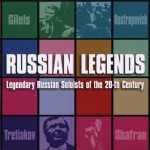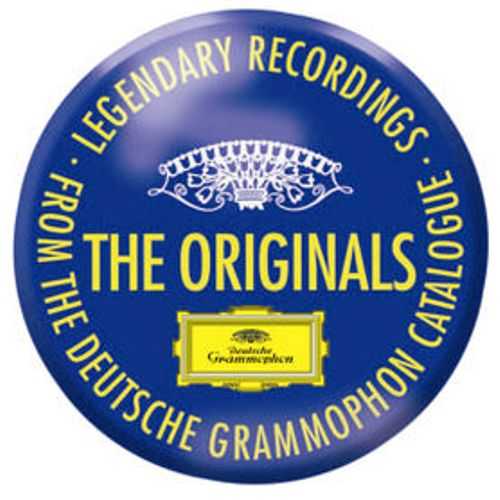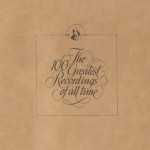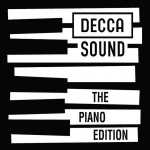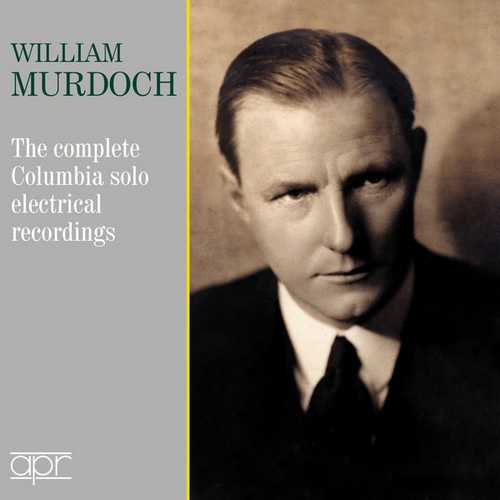
Performer: William Murdoch
Number of Discs: 2
Format: FLAC (tracks)
Label: APR
Catalogue: APR6029
Release: 2019
Size: 543 MB
Recovery: +3%
Scan: yes
CD 01
Mendelssohn: Song without words in A flat major Op. 38
01. No. 6 in A-Flat Major, MWV U 119 “Duetto”
Mendelssohn: Song without words in A major Op. 62
02. No. 6 in A Major, MWV U 161 “Spring Song”
Chopin: Étude Op. 25
03. No. 1 in A-Flat Major “Aeolian Harp”
Mendelssohn: Waltz in F major Op. 34
04. No. 3 in F Major
05. Mendelssohn: Berceuse in D flat major Op. 57
06. Mendelssohn: Ballade No. 3 in A flat major Op. 47
Schumann: Romanze in F sharp major Op. 28
07. No. 2 in F-Sharp Minor
Liszt: Liebesträume No. 3 S541 / 3
08. Oh Lieb, so lang du lieben kannst (After S. 298)
Liszt: Grandes Études de Paganini, S. 141
09. No. 3, La campanella
Liszt: Hungarian Rhapsody, S244
10. No. 12 in C-Sharp Minor, S. 244
Liszt: ‘Hark, Hark the Lark’ Lieder von Fr. Schubert, S558
11. No. 9, Ständchen von Shakespeare (After Schubert’s D. 889)
Schubert: Marche militaire in D major D733
12. No. 1 in D Major (Arr. C. Tausig for Piano Solo)
Brahms: Waltz, Op. 39
13. No. 15 in A-Flat Major (Version for Solo Piano)
Paderewski: Minuet in G major, Op. 14
14. No. 1, Minuet in G Major
Grieg: Brudefølget drar forbi
15. No. 2, Norwegian Bridal Procession
Sibelius: Valse Triste, Op. 44 No. 1
16. Kuolema, Op. 44: II. Valse triste (Arr. for Piano Solo)
Rachmaninov: Prelude in C sharp minor Op. 3
17. II. Prelude in C-Sharp Minor “The Bells of Moscow” (1926 Recording)
Rachmaninov: Prelude Op. 23
18. No. 5 in G Minor
Rachmaninov: Prelude Op. 32
19. No. 12 in G-Sharp Minor
Rachmaninov: Prelude in C sharp minor Op. 3
20. II. Prelude in C-Sharp Minor “The Bells of Moscow” (1931 Recording)
CD 02
Beethoven: Piano Sonata No. 8 in C minor, Op. 13 ‘Pathetique’
01. I. Grave – Allegro di molto e con brio
02. II. Adagio cantabile
03. III. Rondo. Allegro
Beethoven: Piano Sonata No. 23 in F minor, Op. 57 ‘Appassionata’
04. I. Allegro assai
05. II. Andante con moto
06. III. Allegro ma non troppo
07. Bach: Chorale Prelude BWV645 ‘Wachet auf, ruft uns die Stimme’
Debussy: Préludes – Book 1
08. No. 5, Les collines d’Anacapri
Debussy: Préludes – Book 2
09. No. 5, Bruyères
Debussy: Préludes – Book 1
10. No. 12, Minstrels
Albéniz: Iberia, book 1
11. No. 2, El puerto
Falla: Piezas españolas
12. No. 2, Cubana
13. No. 4, Andaluza
14. Carse: Miniature Scherzo
15. Walthew: Sun and Shade
16. Dunhill: Dew Fairies
17. Lee: Legend
18. Morgan: Le bal poudre Op. 54
19. Rowley: The Rambling Sailor
20. Swinstead: Serenata
21. Dyson: Primrose Mount
22. Bowen: Rêverie in B Major Op. 86
23. Ireland: Piano Sonatina: III. Rondo. Ritmico, non troppo allegro
Many of these recordings date from the earliest days of electrical recording which only beganin 1925. Although the system was perfected within a very few years and ultimately was a vastimprovement over the previous ‘acoustic’ process, some of the discs from 1925 and 1926 seemto have been recorded at an excessively low level, resulting in a weak signal that can becomeseriously compromised by the inevitable surface noise of shellac discs. This, coupled with thedifficulty of finding pristine copies of the original discs, has meant that several sides are noisierthan one would have hoped. In addition, Murdoch’s first electrical session of 23 November 1925suffers from both a ‘boxy’ acoustic and an out-of-tune piano. In the interests of preserving theserare discs it seems better to include everything rather than just the best of them and I hopecollectors can hear past these defects and enjoy the very musical playing of this almost forgottenartist.
Australian pianist William Murdoch (1888–1942) is almost forgotten today but was a major UK Columbia recording artist in the 1920s. A consummate musician, he was known as a chamber player as much as a soloist, as evidenced by many recordings, but was also the first pianist to record Beethoven’s 3rd piano concerto (acoustically in 1925). Amongst his solo recordings, pride of place must go to the two Beethoven sonatas which burst with energy and passion while never descending into superficiality. A little known and fascinating part of his legacy is his recording of the eight test pieces written for the National Piano Competition of 1928 organized by the Daily Express. This unique event was open to pianists of all abilities from beginner to advanced and the specially commissioned pieces, by contemporary British composers, reflected these different levels. Murdoch’s recordings originally came with spoken commentaries on interpretation.
